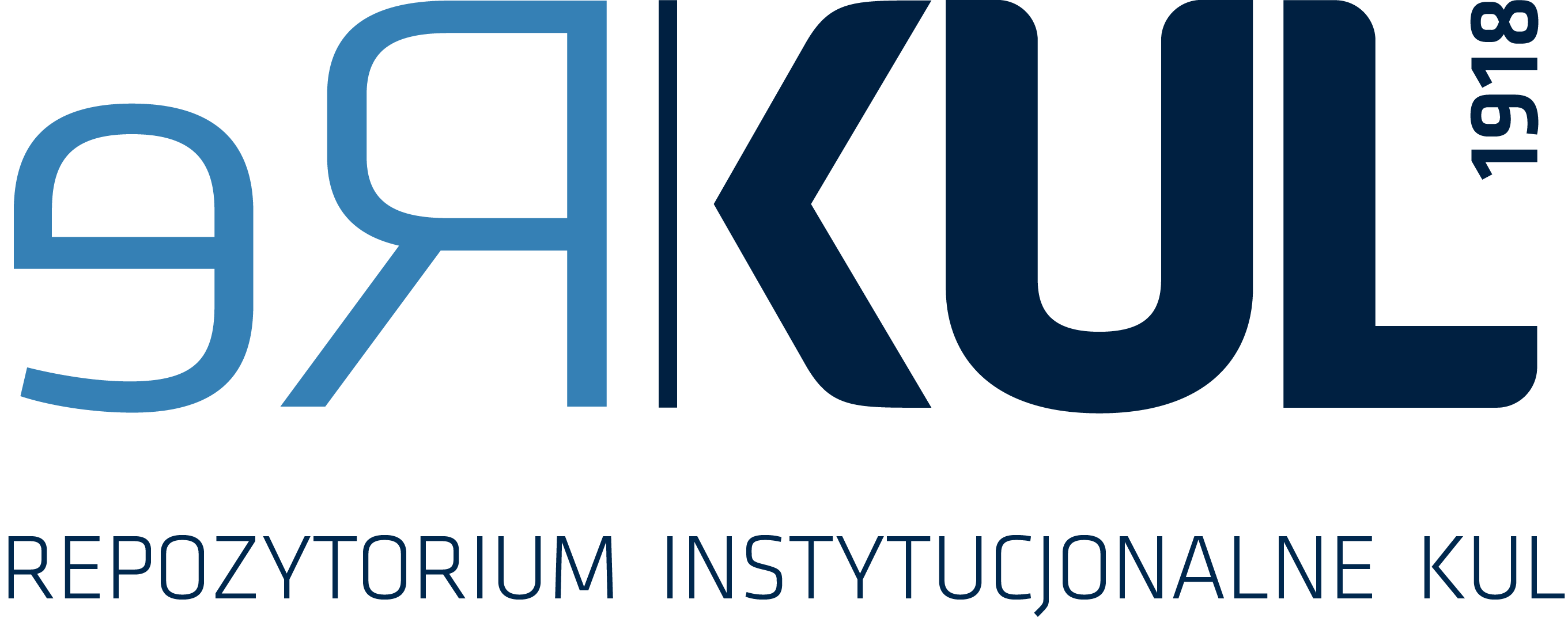The Repository collects scientific achievements of employees and doctoral students of the John Paul II Catholic University of Lublin. The purpose of the repository is dissemination of the scientific achievements of the John Paul II Catholic University of Lublin, promoting conducted scientific research and supporting didactic activities. The repository collects, stores and shares digital documents in the form of books, scientific articles, scientific journals, conference materials, didactic materials etc.
Communities in ReKUL
Recent Submissions
listelement.badge.dso-type Item , The Styles of Bystander Intervention Scale - Invariance(2026) Przepiórka, AnetaIn the study, the initial sample consisted of 17656 (10788 females, M = 23.32 years, SD = 5.39) individuals from 61 countries: Albania, China, Macao, France, Ecuador, Spain, Ireland, Japan, Kuwait, Poland, Turkey, Ukraine, Philippines, Sri Lanka, Argentina, Northern Cyprus, Dominican Republic, Germany, Jordan, Norway, Pakistan, Slovenia, Mexico, Venezuela, Slovakia, Hungary, Canada, Gibraltar, Australia, Latvia, Vietnam, Serbia, India, USA, United Kingdom, Estonia, Nigeria, Cyprus Greece, Italy, Azerbaijan, Peru, South Africa, Zambia, Ghana, New Zealand, Czech Republic, Algieria, Romania, Iceland, Bosnia and Chercegovina, North Macedonia, Mozambique, Kazakhstan, Bolivia, Armenia, Brazil, Bangladesh, Malaysia, Iraq, Hong Kong, and Lithuania. The data concern the analysis of the measurement invariance of the Styles of Bystander Intervention Scale between the countries analysed and gender. W badaniu początkowa próba składała się z 17 656 osób (10 788 kobiet, średnia wieku 23,32 lat, odchylenie standardowe 5,39) z 61 krajów: Albania, Chiny, Makau, Francja, Ekwador, Hiszpania, Irlandia, Japonia, Kuwejt, Polska, Turcja, Ukraina, Filipiny, Sri Lanka, Argentyna, Cypr Północny, Dominikana, Niemcy, Jordania, Norwegia, Pakistan, Słowenia, Meksyk, Wenezuela, Słowacja, Węgry, Kanada, Gibraltar, Australia, Łotwa, Wietnam, Serbia, Indie, USA, Wielkiej Brytanii, Estonii, Nigerii, Cypru, Grecji, Włoch, Azerbejdżanu, Peru, RPA, Zambii, Ghany, Nowej Zelandii, Czech, Algierii, Rumunii, Islandii, Bośni i Hercegowiny, Macedonii Północnej, Mozambiku, Kazachstanu, Boliwii, Armenii, Brazylii, Bangladeszu, Malezji, Iraku, Hongkongu i Litwy. Dane dotyczą analizy niezmienności pomiarowej skali "The Styles of Bystander Intervention Scale" między analizowanymi krajami i płcią.listelement.badge.dso-type Item , Psychologiczne aspekty naturalnego planowania rodziny(Polskie Stowarzyszenie Nauczycieli Naturalnego Planowania Rodziny, 2006) Kornas-Biela, Dorotalistelement.badge.dso-type Item , Afirmacja życia w kontekście jego zagrożeń po niepomyślnej diagnozie prenatalnej(Wydawnictwo Polihymnia, 2012) Kornas-Biela, Dorotalistelement.badge.dso-type Item , Kształtowanie inteligencji moralnej dzieci jako zadanie wychowawcze rodziców(Wydawnictwo Naukowe UAM, 2020) Kornas-Biela, Dorotalistelement.badge.dso-type Item , Inteligencja moralna a wymagania współczesnego rynku pracy(Akademia im. Jana Długosza w Częstochowie, 2016) Kornas-Biela, DorotaW artykule zostało scharakteryzowane pojęcie inteligencji moralnej jako nowego pojęcia na terenie psychologii, odróżniającego się od inteligencji rozumowej, emocjonalnej, społecznej i duchowej. Przedstawiono różne jej rozumienia na terenie literatury przedmiotu, a tym samym różne wymiary jako jej istotne charakterystyki. Skupiono się na uwypukleniu znaczenia inteligencji moralnej dla funkcjonowania zawodowego, satysfakcji z pracy oraz jej efektywności w pracy zarówno pracowników jak i kadry kierowniczej. Podkreślono rolę inteligencji moralnej jako istotnego czynnika warunkującego sukces firm i korporacji wobec wymagań współczesnego rynku pracy. Treść artykułu wskazuje na konieczność rozwinięcia refleksji i badań empirycznych nad inteligencją moralną i możliwości jej kształtowania w ramach przygotowania do zawodu, poradnictwa zawodowego oraz w czasie zatrudnienia. Moral Intelligence and the Contemporary Labor Market Requirements In this paper there is characterized the concept of moral intelligence as a new concept in psychological literature which is distinguished from cognitive intelligence, social, emotional and spiritual intelligence. There were presented various meanings of this concept in the subject literature, its dimensions and characteristics. A focus was made on the meaning of this concept for vocational functioning, work satisfaction, and its efficiency for both employees and their managers. There was accentuated the role of moral intelligence as an essential factor conditioning success of companies and corporations in front of the requirement of contemporary labor market. The content of the article is indicating a necessity of developing reflexions and empirical investigating on moral intelligence and possibility of shaping it during vocational education, professional guidance and during employment.listelement.badge.dso-type Item , Czystość(Polskie Wydawnictwo Encyklopedyczne, 2016) Kornas-Biela, Dorotalistelement.badge.dso-type Item , Psychospołeczne konsekwencje rozwoju usług w zakresie diagnostyki prenatalnej(Polskie Towarzystwo Ginekologiczne, 1997) Kornas-Biela, DorotaDiagnostyka prenatalna łączy się ściśle z nowymi metodami prokreacji oraz z usługą aborcyjną, gdyż wobec niewielu zdiagnozowanych prenatalnie chorób jesteśmy w stanie podjąć jakieś skuteczne działanie lecznicze. Rozwój usług w tej dziedzinie niesie ze sobą ryzyko jeszcze większej medykalizacji i komercjalizacji okresu ciąży oraz dziecka poczętego, zmian w systemie ogólnospołecznych wartości oraz w rozumieniu relacji rodzinnych, wprowadzenie kontroli „jakości życia" oraz ograniczenia wolności w wyborach prokreacyjnych, nasilenia negatywnych postaw wobec osób niepełnosprawnych i zmniejszenia zobowiązania ze strony państwa do opieki nad nimi. W literaturze przedmiotu wskazuje się prawie wyłącznie na pozytywne skutki rozszerzania się praktyki korzystania przez rodziców z usług prenatalnych (np. likwidacja lęku o stan zdrowia dziecka) natomiast milczy się na temat psychologicznych zagrożeń z tym związanych. Prenatal diagnosis and abortion is an increasingly important part of the modern reproductive medicine. Prenatal diagnosis often leads to abortion because contemporary medicine can treat only few prenatally diagnosed health problems. The development of prenatal services increases medicalization and commercialization of pregnancy and commodification of life and bodies; impacts the system of values; force us to confront questions we never faced before and to examine the nature and origin of motherhood, parents - child bond and other family connected concepts; results in control of quality of life; offers new choices and creates new limitations of choice (gives illusionary choice); decreases positive attitudes towards disabled people and diminishes social and health care for those persons from the state.listelement.badge.dso-type Item , Pełnia istnienia(Polskie Wydawnictwo Encyklopedyczne, 2016) Kornas-Biela, Dorota

